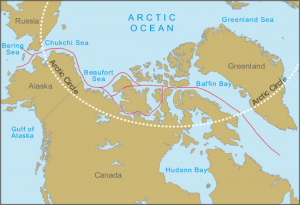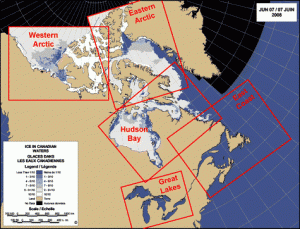 |
 06-04-2008, 11:43 PM
06-04-2008, 11:43 PM
|
#1
|
|
Ensign
Join Date: Jun 2008
Posts: 13
|
Read the thread about the Panama delays and would like to bring up another way to the Pacific than the way round the Cape Horn. Every year one is reading more about how the sea is opening more permanently in the North West Passage. From Europe to Western Canada it would certainly be a real shortcut. The problem for now is that the route has only been sailable from July and not earlier. That is all fine and usually the weather at that latitude is very good in the summer months, but arriving at the Bering Sea in August is something else. That is the time when the autumn storms begin. Now, if the passage is opening just a month earlier, then it should be working fine, planning wise. Has anyone been thinking seriously on that trip? I for one certainly have. I was stationed in Greenland for three years and think I know the area a bit, at least weatherwise.
__________________
__________________
The man onboard is the Captain but he knows who is the Admiral
|

|

|
 06-05-2008, 07:56 AM
06-05-2008, 07:56 AM
|
#2
|
|
Admiral
Join Date: Oct 2004
Posts: 3,067
|

Hello Sea Otter,
What type of boat (our type of cruiser) would you see making this passage ?
WikiPedia has recorded a number of sailboats having made the passage :-
!970s
In June 1977 sailor Willy de Roos left Belgium to attempt crossing the Northwest Passage in his 13.8 m (45 ft) steel yacht Williwaw. He reached the Bering Strait in September and after a stopover in Victoria, British Columbia, went on to round Cape Horn and sail back to Belgium, thus being the first sailor to circumnavigate the Americas entirely by ship.[19]
1980s
David Scott Cowper set out in July 1986 from England in a 12.8 m (42 foot) lifeboat, the Mabel El Holland, and survived 3 Arctic winters in the Northwest Passage before reaching the Bering Strait in August 1989. He then continued around the world via the Cape of Good Hope to arrive back on 24 September 1990, becoming the first vessel to circumnavigate via the Northwest Passage.
2000s
On September 1, 2001, Northabout, an 14.3 m (47 ft) aluminium sailboat with diesel engine[22], built and captained by Jarlath Cunnane, a retired construction manager, completed the Northwest Passage east-to-west from Ireland to the Bering Strait. The voyage from the Atlantic to the Pacific was completed in a very fast time of 24 days—from sailing into Lancaster Sound off Baffin Bay on August 7, 2001, to reaching the Bering Strait on September 1. The Northabout then cruised in Canada for two years before it returned to Ireland in 2005 via the Northeast Passage thereby completing the first east-to-west circumnavigation of the pole by a single sailboat. The Northeast Passage return along the coast of Russia was slower, starting in 2004, with an ice stop and winter over in Khatanga, Siberia—hence the return to Ireland via the Norwegian coast in October 2005. On January 18, 2006, The Cruising Club of America awarded Jarlath Cunnane their Blue Water Medal, an award for "meritorious seamanship and adventure upon the sea displayed by amateur sailors of all nationalities."
On 18 July 2003, a father and son team, Richard and Andrew Wood, with Zoe Birchenough sailed yacht Norwegian Blue into the Bering Strait, which marks the western entrance to the Northwest Passage. Exactly two months later, in what proved to be a very difficult ice year and without ice breaker assistance, she sailed into the Davis Strait to become the first British yacht to transit the Northwest Passage from west to east. She also became the only British vessel to complete the Northwest Passage in one season.
On May 19, 2007, a French sailor, Sébastien Roubinet, and one other crew member left Anchorage, Alaska in Babouche, a 7.5 m (25 ft) ice catamaran designed to sail on water and slide over ice. The goal was to navigate west to east through the Northwest Passage by sail only. Following a journey of more than 7,200 kilometres (4,474 mi), Roubinet reached Greenland on September 9, 2007, thereby completing the first Northwest Passage voyage made without engine in one season.

__________________
__________________

|

|

|
 06-05-2008, 08:52 PM
06-05-2008, 08:52 PM
|
#3
|
|
Ensign
Join Date: Jun 2008
Posts: 13
|
We have an 1986, 51 feet, Beneteau Idylle 15.50 with an unusual thick hull in GRP, single ply. We hit a container in the Med, but no cracks in the hull. So a bit of ice, if unlucky, will not be a disaster. It is only if we can pass before the storms set in around August in the Berings Strait, that we will consider it for real. It is definitely a shorter route with fantastic scenery. But if we do, we will miss the wonderful Carribbean.
__________________
The man onboard is the Captain but he knows who is the Admiral
|

|

|
 06-07-2008, 11:58 PM
06-07-2008, 11:58 PM
|
#4
|
|
Lieutenant
Join Date: Jan 2007
Posts: 84
|
Good luck, From what I could find there is no comercial shipping yet, Way to much ICE. 1 Canadaian Icebreaker ship did it and spent 7 months in dry dock for repairs.
__________________
Cruising Bahamas
|

|

|
 06-08-2008, 02:48 AM
06-08-2008, 02:48 AM
|
#5
|
|
Admiral
Join Date: Oct 2004
Posts: 3,067
|

Sea Otter,
Here is a link which provides a daily update on the ice in the North West Passage :-
N.W.P> ICE
This graphic shows the ice:-

With today's technology at the click of a button - being able to plan a campaign to transit the North West Passage is now no longer a guessing game - very difficult, YES - but, certainly possible for a well found cruising sailboat crewed by crew who have the intestinal fortitude to take on the challenge!
As a footnote - friends of mine Roger and Gaynelle Swanson, on whose 57ft Bowman Ketch "Cloud Nine" I spent some time with in Southern Thailand when they where cruising South East Asia in the latter part of the 90s. In 2007 CLOUD NINE became the first American sailing vessel in history to transit the Northwest Passage from the Atlantic to the Pacific and has many significant sailing accomplishments to her credit including three circumnavigations.
CLOUD NINE is a 57 ft Bowman ketch designed by Holman & Pye and built in Emsworth, England, Her hull is GRP
Richard
__________________

|

|

|
 06-08-2008, 05:46 AM
06-08-2008, 05:46 AM
|
#6
|
|
Admiral
Join Date: Sep 2005
Posts: 1,619
|

Quote:
Originally Posted by Lynx

1 Canadaian Icebreaker ship did it and spent 7 months in dry dock for repairs.
|
I understand the concept that if an icebreaker can't cope with this then how can a yacht? Well we must not forget that Canadian icebreakers, and I have experience from the Louis St. Laurant , work by ramming the ice, riding up on it and then crushing it by their own weight. Modern Baltic Sea icebreakers, working in new ice only, have propellers in the fore as well as the stern and "chew" their way through the ice. Both of these methods of ice navigation are confrontational, i.e. they rely on power and force to overcome the ice. This, no matter how powerful the vessel, will only succeed to a certain level.
Ships other than icebreakers have transited the NW passage. The tanker Manhattan completed two transits, the first in 1969. She was a huge ship with an enormous amount of power but despite that needed the assistance of the Canadian icebreaker John A. McDonald and the U.S. icebreakers Westwind and Northwind.
A sailing vessel, be it Amundsen's Gjøa or a modern yacht, does not have the mass or power to force its way through the ice and so must choose to wait patiently until the area is ice-free or follow polynyas which itself is a risky business and may not advance the cause so very much as polynyas tend to be circular or, at best, curved. Gjøa, during her transit, did follow polynyas as she had the capability to withstand relatively high ice pressure if the polynya closed whereas a smaller, modern yacht would not normally be able to survive such treatment.
When we here the global warming debate we may think that ice reduction is something new but it has been going on for quite a long time. Anyone transiting the NW passage today would not have the problems faced by Franklin, Davis, Armundsen et al. Still, it is a mighty achievement even in today's "milder" climate.
Aye // Stephen
|

|

|
 06-08-2008, 03:43 PM
06-08-2008, 03:43 PM
|
#7
|
|
Ensign
Join Date: Jun 2008
Posts: 13
|

Thanks MMNETSEA, nice with something new to check upon. Sorry for repeating myself, but we would only think of this passage if there is a noticable retreat of the ice frontier that make it possible to start early June. A few here think we are just some adventurous newbees, nothing could be more wrong. If we see a chance for stable conditions (more than one or two years) then why not? We are certainly not throwing us into something we have not carefully calculated beforehand.
In my carrier before retirement, I was a SAR helicopter pilot stationed in Greenland and has seen the weater all around the year from north east Canada to all over Greenland, seen the iceshift vary from year to year. Even so, in those days we were boating in Greenland with the boats in the water the year around, but only fun trips in the summer period. This was in Nuuk, what we in the old days called Godthåb.
The thought of opening this thread was to get all possible information from people who would be intersted in such a passage or have actualy done it or know someone who has done it. Listen to people who has knowledge about the "fairly new" ice shelf retreat. It seems to accelerate by the square of speed due to more dark colour (from the seawater) that do not reflect the heat radiation as the white ice does. Such a passage needs a lot of planning and I mean a few years and more.
__________________
The man onboard is the Captain but he knows who is the Admiral
|

|

|
 06-08-2008, 04:05 PM
06-08-2008, 04:05 PM
|
#8
|
|
Admiral
Join Date: Jul 2004
Posts: 2,098
|
Back in '91 or '92 we met a German (East, I believe) who had just recently completed a trip through the NW Passage. He cruised on an aluminum sloop and wrote articles of his cruising for various cruising mags. His name was Clark something. Apparently he was rather well-known in Germany, at least.
He gave a slide show presentation of their trip through the NW passage, and it sure didn't inspire me to want to do it. They never got out of foul weather gear, and had to work very hard to get all the way through before the ice closed them in. He was prepared to winter over up there, but his Australian wife/partner wasn't. Can't blame her.
It was interesting, though a very long way under pressure of making it through in a relatively short time (July to September?). I'm a more leisurely cruiser. Having to meet a schedule makes me cranky. 
|

|

|
 06-09-2008, 02:20 AM
06-09-2008, 02:20 AM
|
#9
|
|
Moderator
Join Date: Jun 2007
Home Port: Washington DC
Vessel Name: SV Mahdee
Posts: 3,236
|
The story I enjoyed the most was about a young crew from Poland who did the NW passage in something like 4 weeks. They used their tender towing a line to a paraglider to "scout" the ice ahead and find their way through it.
You can read some about their journey in 2006 here
|

|

|
 06-09-2008, 03:39 PM
06-09-2008, 03:39 PM
|
#10
|
|
Ensign
Join Date: Jun 2008
Posts: 13
|
Quote:
Originally Posted by redbopeep

The story I enjoyed the most was about a young crew from Poland who did the NW passage in something like 4 weeks. They used their tender towing a line to a paraglider to "scout" the ice ahead and find their way through it.
You can read some about their journey in 2006 here |
Thanks for the contribution to our knowledge bank, it is really interesting reading about that passage.
Thanks again, cheers!
__________________
__________________
The man onboard is the Captain but he knows who is the Admiral
|

|

|
 |
|
Currently Active Users Viewing This Thread: 1 (0 members and 1 guests)
|
|
|
 Posting Rules
Posting Rules
|
You may not post new threads
You may not post replies
You may not post attachments
You may not edit your posts
HTML code is Off
|
|
|
|
 Recent Threads
Recent Threads |
|
|
|
|
|
|
|
|
|
|
|
|
|
|
|
|
|
|
|
|
|
|
|












 Linear Mode
Linear Mode






























